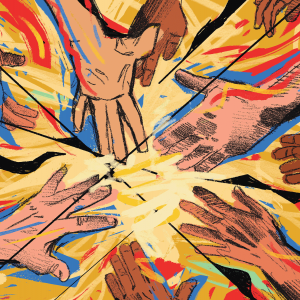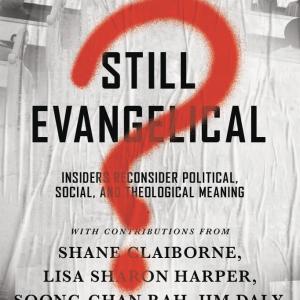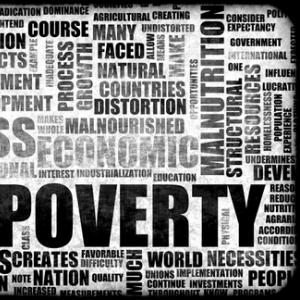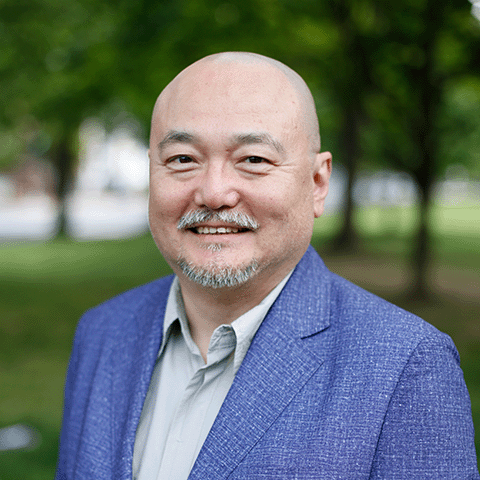
Soong-Chan Rah joined Fuller Theological Seminary’s faculty in 2021 as the Robert Boyd Munger professor of evangelism. Prior to his appointment at Fuller, Rah served as the Milton B. Engebretson professor of church growth and evangelism at North Park Theological Seminary.
He holds a doctorate in theology from Duke Divinity School, with a primary field of study in theology and ethics and a secondary field of study in American evangelical history. He also holds a master of divinity and a doctorate of ministry with a concentration in urban ministry leadership, from Gordon-Conwell Theological Seminary, as well as a master’s in theology from Harvard University, with a thesis on the immigrant church.
Rah has authored or coauthored over a half dozen, and many award-winning, books including The Next Evangelicalism: Freeing the Church from Western Cultural Captivity , Many Colors: Cultural Intelligence for a Changing Church, Prophetic Lament: A Call for Justice in Troubled Times , Return to Justice: Six Movements that Reignited Our Contemporary Evangelical Conscience , Unsettling Truths: The Ongoing, Dehumanizing Legacy of the Doctrine of Discovery , and Forgive Us: Confessions of a Compromised Faith.
He is an ordained pastor in the Evangelical Covenant Church, and a member of the Academy for Evangelism in Theological Education, American Academy of Religion, and American Society of Missiology. He has spoken widely on the topics of the witness of the church, cross-cultural ministry, and social justice at academic conferences, seminaries, Christian colleges, local churches, denominational gatherings, and ministry conferences on both the domestic and global level.
Posts By This Author
Can U.S. Evangelicals Lay Down Power, Not Seek More of It?
THROUGHOUT THE HISTORY of North American Christianity, the church has vacillated in its view of the intersection of evangelism and social justice. For a significant portion of that history, the church has been a moral voice on behalf of the “least of these” and advocated for justice in the public realm. Many Catholics and other Christians have not wavered in this work.
Since early in the 20th century, however, U.S. evangelical Christians in particular have focused primarily on personal evangelism and separated it from the justice witness of the church in public life. One of the negative consequences of the divorce of evangelism from justice has been the inability of evangelicals to engage politics in a biblical manner. Because evangelicals have seen social justice as a “secular” activity, our understanding of how justice works in the public square has been shaped more by the secular political imagination than by a biblical political imagination.
In the absence of a political imagination rooted in Jesus’ gospel of sacrificial love and the prophetic tradition, dysfunctional expressions such as Christian nationalism, conflating faith with a specific party, and extreme polarization have emerged as the de facto position of much of the church in the political realm. The public sphere is captive to divisive and contentious rhetoric and characterized by a quest for power, and the desire to hold and wield that power over and against one’s political opponent. The goal of many Christians in U.S. politics has deteriorated into aquiring power rather than serving the common good.
Much of U.S. evangelicalism has seemingly fallen into this trap — in contrast to the historical call of the church to be an advocate for the voiceless and powerless. How would engagement in the public realm change if the political imagination of evangelicals were to shift from this grab for power toward the Jesus’ teaching to be servants of all? How can scripture and biblical examples offer insight in this fraught political season?
A return to the biblical text can help us better understand the foundations of the church and, therefore, the full role of the church in the public arena. Our calling as the church is not only to save individual lives from a “wrecked vessel” but also to honor the imago dei in every individual and offer hope by caring for the very least of these — by being salt and light in the world.
Lament Is the Appropriate Response to the Reality of Pain
Last week was extraordinarily difficult for many Asian Americans. The trauma of the violence perpetrated against Asian women in Atlanta was the culmination of a yearlong spike in violence against the Asian American and Pacific Islander (AAPI) community. An already fearful and silenced community was re-traumatized as police and media discounted the identity of the victims and centered the narrative on the challenges of the shooter.
Lamentations 5 for 2020
Remember, Lord, what happened to Ahmaud Arbery, Breonna Taylor, and George Floyd;
look and see the disgraceful way their bodies were treated.
Our inheritance of the image of God in every human being
has been co-opted and denied by others.
How the Delusion of Exceptionalism Obstructs Lament
The need for lament could not be more urgent. The painful reality of the loss of more than 100,000 American lives requires the response of lament. However, a genuine corporate lament seems to have eluded many Americans, even those in the church. Lament is a biblical practice that has been long-neglected in the American church.
Blinded By False Victories
AMERICAN CHRISTIAN exceptionalism focuses on a narrative of success and victory. When suffering occurs, it’s considered a hindrance to the work of God in the world. The narratives of suffering communities, therefore, are ignored or removed from the dominant narrative of triumph. Stories of successful church plants and growing megachurches with huge budgets are front and center in how we tell the story of American evangelicalism.
Spanish-speaking storefront churches embody a profound, faithful spirituality in the midst of suffering. However, for many white evangelicals looking for the next magic formula to grow their churches, these churches may be deemed too small and even “illegal.”
Lament Is a Necessary Step Toward Healing
The assumed exceptionalism and excessive triumphalism of the American church conflicts with the biblical call for humility as evidenced by lament. The practice of lament in the Bible confronts our American Christian assumptions. Biblical lament calls for honesty and truth-telling about the broken state of society and the individual. As such, the excessive triumphalism of American society has nearly quashed a necessary countercultural practice.
A Lament for Our Nation
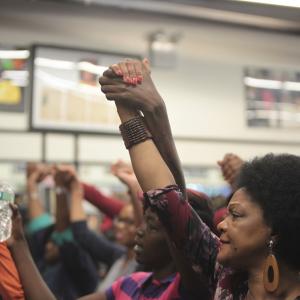
August 2104 rally to address the ongoing violence in Ferguson, Mo., attended by Congressman Hakeem Jeffries & the Garner family. a katz / Shutterstock.com
7 Our ancestors sinned the great sin of instituting slavery; they are no more—but we bear their shame.
8 The system of slavery and institutionalized racism ruled over us,
and there is no one to free us from their hands.
9 We get our bread at the risk of our lives because of the guns on the streets.
No Easy Road to Freedom
THE KILLING OF 18-year-old Michael Brown in Ferguson, Mo., last year and the events that followed sparked protests by the community in the St. Louis area asserting that black lives matter and ignited a discussion on race relations in the United States.
On the heels of non-indictments in the slaying of Brown and other black men, our nation focused its attention on the drastic inconsistencies inherent in our judicial system. To many observers, black lives had less standing in our nation than white lives.
Rodney King, Trayvon Martin, Mike Brown, Eric Garner, Tamir Rice, Walter Scott, and the churchgoers in Charleston, S.C., are part of a long list of black victims of violence. They are victims of an American narrative that devalues black souls, black lives, black bodies, and black minds. In response to these tragic events, particularly since the non-indictment of the police officers who killed Brown and Garner, many evangelicals have been calling for a biblical practice that is often absent in American Christianity—the call to lament.
On one level I am thrilled that evangelicals are discovering the importance of lament in dealing with racial injustice. However, I am concerned that the way lament is being used by some white evangelicals is a watered-down, weak lament that is no lament at all.
Lament is not simply feeling bad that Brown won’t be able to go to college. Lament is not simply feeling sad that Garner’s kids no longer have a father. Lament is not asserting your right to confront the police because, as a white person, you won’t be treated in the same way that a black protester may be treated. Lament is not the passive acceptance of tragedy. Lament is not weakly assenting to the status quo. Lament is not simply the expression of sorrow in order to assuage feelings of guilt and the burden of responsibility.
A Call for a National Lament
Lament is not a passive act. Many Christians may hear the word lament and assume that feeling bad about suffering is the purpose of lament. How sad that people died. How sad that the shooter had a mental illness. But lament moves beyond bad feelings for the privileged. Lament is subversive and an act of protest. The powerful and the privileged have no problem being heard. It is the marginalized that need to be heard. The voiceless speak through lament. They cry out that things aren’t right. They are not the way things are supposed to be. Lament voices the prayers of the suffering and therefore serves as an act of protest against the powers.
Lament and the Call to Advocacy
The work of the prophet is to stand as an advocate for others. The advocate role is an important role in the ministry of justice. Many American Christians hold a position of privilege in American society. As the privileged, there is an important voice that can be raised on behalf of the marginalized. American Christians can advocate for the rights of the unborn, the poor, and the oppressed of our society. Part of our strength would not be to effect change that would further our privilege and affluence, but to advocate for change that would benefit the very least of our brothers and sisters. The role of the geber is to advocate for the suffering in Jerusalem and offer a lament on behalf of the suffering.
Full-Body Repentance
THE CRY OF the church to the world should be “Forgive us.”
At a time when the American church struggles with finding its place in the world and struggles with asserting its identity, could the church be known as the community that models confession, repentance, and the seeking of forgiveness? At this moment in history, the American church is often ridiculed or portrayed as unforgiving and ungracious. Could the church offer a counter-narrative, not of defensiveness or derision but of an authentic confession and genuine reconciliation? By examining seven different areas where the church has committed sin, we ask the church to consider the spiritual power and the theological integrity of a church that seeks forgiveness for those sins.
Our scriptures testify to the necessity of confession. Confession is central to the Christian faith. The importance of confession arises from the Christian view of sin. Sin is a reality and must be taken seriously. Evangelicals consistently begin our gospel presentation with the centrality of sin to the human experience. American evangelicals often assert that the beginning of the work of God’s forgiveness is the recognition of our need for God because of human sinfulness.
It is antithetical to the gospel when we do not confess all forms of sin—both individual and corporate. The reason evangelicals can claim to be followers of Jesus is because there has been an acknowledgement of sin and the seeking of God’s grace through Jesus Christ that leads to the forgiveness of sin.
The American Church's Absence of Lament
When we consider the typical church worship service in the United States, we discover certain trends. Lament and stories of suffering are conspicuously absent. In Hurting with God, Glenn Pemberton notes that laments constitute 40 percent of the Psalms, but in the hymnal for the Churches of Christ, laments make up 13 percent, the Presbyterian hymnal 19 percent, and the Baptist hymnal 13 percent.
Christian Copyright Licensing International (CCLI) licenses local churches for the use of contemporary worship songs. CCLI tracks the songs that are employed by local churches, and its list of the top 100 worship songs as of August 2012 reveals that only five of the songs would qualify as a lament. Most of the songs reflect themes of celebratory praise: “Here I Am to Worship,” “Happy Day,” “Indescribable,” “Friend of God,” “Glorious Day,” “Marvelous Light,” and “Victory in Jesus.”
How we worship reveals what we prioritize. The American church avoids lament. Consequently the underlying narrative of suffering that requires lament is lost in lieu of a triumphalistic, victorious narrative. We forget the necessity of lament over suffering and pain. Absence doesn’t make the heart grow fonder. Absence makes the heart forget. The absence of lament in the liturgy of the American church results in the loss of memory.
A Time to Mourn
This morning I began preparing for a trip to Canada. I pulled out my grey North Park University hoodie to pack for the colder nights. Last year, a few days after the shooting of Trayvon Martin, North Park sponsored a justice conference. I wore that hoodie during my talk.
In retrospect, it feels like an empty gesture — an attempt to empathize with an experience that I, as a Korean-American, could never fully understand. In light of the Zimmerman verdict, I’ve been stunned into silence. I’m reeling from a deep disappointment in the American justice system and maybe even more distraught by the response of many in the white evangelical community that wants to argue the minutia of the law rather than trying to understand our brothers and sisters who are expressing a deep sense of lament.
The tragedy of Trayvon Martin requires an ongoing lament, which may be why it has been so difficult for evangelicals to engage on this issue.
If I Had a Million Dollars ...
Play along with me. If you had $1 million to spend to help stimulate the economy, what would you do? What would I do?
Option 1:
Give the money to a billionaire, in the blind hope that the billionaire will pass along that million to his employees in some form. Or that he’ll spend it on a nice luxury product that (hopefully) will be an American product. Or that he won’t exercise the many loopholes that still exist and he’ll give that whole amount back to the U.S. government to spend. And of course, pray that the money won’t go into an offshore investment account somewhere in the Caribbean or Switzerland.
But what would Jesus do? What investments would Jesus make that I would want to make as well?
'The Line,' the 47 Percent, and the Food Stamp Professor
When I was a 17-year-old senior in high school, I was in several Advanced Placement courses. As the school year drew to a close, I wanted to take the AP test that would allow me to attain college credit. The AP tests, however, were very, very expensive. I went to my guidance counselor. She said that they could waive the fees for the exams if I qualified for the school’s free lunch program.
I had avoided the free lunch program for years. I had been on the free lunch program in elementary school and middle school but was always embarrassed by it. So when I got to high school, I didn’t apply for it. I picked up a part-time job so I could pay for my own lunch. But now, I wouldn’t be able to take my AP exams if I didn’t fill out the free lunch program form.
So I agreed to fill out the form. Later that day, my guidance counselor sent a student aide with the form to my social studies class room, where in front of the entire class, she declared that I needed to fill out the free lunch form. I remember the shame of not only my classmates laughing at me that day, but my high school teacher bursting out in laughter as well.
Salt, Light, and Social Change
An evangelical scholar looks at Sojourners' role in evangelical social justice.
Is the Emerging Church for Whites Only?

STILLFX / Shutterstock
AT THE TURN of the millennium, I (Soong-Chan) began hearing a lot about the “emerging church.” It seemed that everywhere I turned somebody was talking about the emerging church. A clear definition of the term was elusive (see “What is the Emerging Church?” by Julie Clawson, below), but the emerging church seemed to reflect ministry and theology rising out of the generation after the baby boomers. In particular, the emerging church was Western Christianity’s attempt to navigate through the context of an emerging postmodern culture.
At the time the emerging church was coming into vogue, I was pastoring a multi-ethnic, urban church plant in the Boston area. It seemed that every brochure for nearly every pastors’ conference I received featured the emerging church. As I began to attend some of those conferences, I noticed that every single speaker who claimed to represent the emerging church was a white male. A perception was forming that this was a movement and conversation occurring only in the white community.
In terms of the public face of the emerging church, white males dominated.
On one occasion, I was at an emerging church conference and was told directly that non-whites were not of any significance in the emerging church. Granted, this was one specific instance, but it led to the sense that the emerging church was not a welcoming place for ethnic minorities. At another conference, on the future of the church, one of the speakers invited up a blond-haired, 29-year-old, white male, replete with cool glasses and a goatee, and pronounced him the face of the emerging church. “This guy is a great representative of the future of American Christianity.” I cringed. In terms of the public face of the emerging church, white males dominated. It seemed like the same old, same old. As per the lyrics by The Who: “Meet the new boss, same as the old boss.”
Why Outsider Critiques are Important for Emergent
[Read more of this blog conversation in response to the Sojourners magazine article "
Avatar and The Blind Side: The Never-ending Messianic Complex Story
The last two movies that my wife and I had the chance to watch were Avatar and The Blind Side. Not sure how that happened, but both movies had very rich missiological and race themes to them. Or maybe I just see everything in that way.
